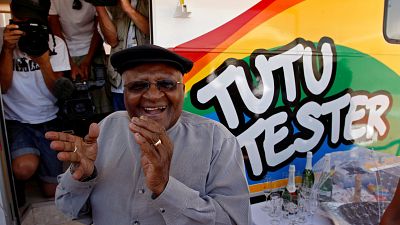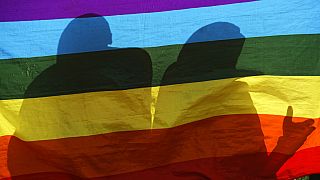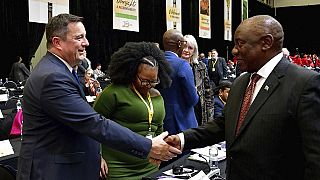South Africa
It certainly will be impossible to mourn Archbishop Desmond Tutu without remembering him for the role he played in fighting for equal rights for LGBTQ+ people in South Africa and across the world. It however appears his campaign against homophobia had little impact on other African countries.
The world can testify that throughout his life, Tutu was a vocal opponent of gender discrimination and supporter of the LGBTQ+ community. He was an active participant in the United Nations' Free & Equal campaign and often compared the struggle of those singled out for their sexual orientation to apartheid.
South Africa is the only African country that has legalized same-sex marriage, and its constitution protects against anti-LGBTQ discrimination. Yet even there, violence against LGBTQ people remains common.
In Cape Town, where Tutu was the Anglican archbishop, members of the LGBTQ+ community reacted to his death with tributes.
Though same-sex marriage has been legalised in South Africa since 2006, South African Anglican law on marriage states: "Holy matrimony is the lifelong and exclusive union between one man and one woman."
Due to this, Tutu's daughter, Mpho Andrea Tutu, who was then an Anglican minister was forced to resign her post after she married a woman Dutch woman named Marceline van Furth in 2015. The arch and his wife were in full support of this union.
"My father campaigned for women's ordination, and so every time I stand at the altar I know that this is part of his legacy," Tutu van Furth said. "It is painful, a very odd pain, to step down, to step back from exercising my priestly ministry." This shows the extent to which Desmond Tutu supported same sex relationship.
The Arch will continue to live on through those who have benefited from his act of love and kindness, particularly Rev Gene Robinson of New Hampshire. Robinson is considered to be the US Episcopal Church's first openly gay bishop. When Robinson was excluded from an Anglican gathering in 2008, Archbishop Tutu stood up for him publicly.
Before Tutus demise on December 26, 2021, many religious leaders across Africa had rejected his ideals about same sex marriage. In Ghana for instance, leaders of the Anglican church, the denomination he belongs to had joined a campaign to pass a bill that would impose prison sentences on people who identify as LGBTQ+ or even support the community.
Though many would not agree with his principles on same sex relations, Tutu would not succumb to pressure to rescind his support for the community. Even at a time in 2013 when the then repressive leader of Zimbabwe, Robert Mugabe mocked him by saying “Tutu should just step down because he supports gays, something that is evil,” he still went ahead to reassure the LGBTQ community of his support. “I would not worship a God who is homophobic,” he said in speech at a UN’s gay rights campaign, 2013. “I would refuse to go to a homophobic heaven. No, I would say, ‘Sorry, I would much rather go to the other place.'” Repeating a statement, he had made in an interview with the BBC in 2007.
Judging from tributes from world leaders and citizens across south Africa since his death, it is clear the arch as he was affectionately called stuck to the ideas of promoting love, acceptance and kindness, regardless of your background, race or sexuality.
Daniel Jay, who works in the medical industry is reported to have said Tutu’s support for LGBTQ people was pivotal in South Africa’s decision to make HIV drugs available at no cost. “I love him to bits,” Jay said.
Beyond South Africa’s borders, recent developments have motivated LGBTQ-rights supporters.
In Namibia, the LGBTQ+ community on November 27 begun a weeklong Pride event in Windhoek, the capital. At the parade, some patrons urged repeal of a Namibian anti-sodomy law that remains in the books though is not enforced.
In the same month, that wind of positivity blew to Botwana where the Court of Appeal unanimously endorsed a 2019 ruling that decriminalized consensual same-sex activities.
Whiles some African countries seem to be accepting same sex relations, others tightening measure to deter people from engaging in the act. In Senegal for instance, 13 opposition legislators recently introduced a bill to toughen penalties against homosexuality, doubling the maximum sentence to 10 years.
In Tunisia a prominent LGBTQ+ activist was allegedly attacked by a police officer. Some of these cases are common in most African countries including Angola, Mozambique and the Seychelles. At the government level, Senegal and Ghana are under scrutiny from LGBTQ-rights supporters.
Alex Kofi Donkor, director of LGBTQ+ Rights Ghana, expressed regret that relatively few African faith leaders shared Tutu’s outlook. “A lot of African preachers hold a lot of prejudice, hate and disgust for the LGBTQ+ community,” he said.
He took to social media to pay tribute to the church man.
As tributes keep pouring in from all over the world, The winner of the 2021 Mr. Gay World pageant, Louw Breytenbach of South Africa also took to social media saying, “RIP to one of the most amazing humans to ever walk this earth!... A warrior for gay rights.”
As for LGBTQ+ rights continues across the African region, the name of Desmond Tutu will never depart from the heart of activists considering the love and sacrifices he laid down for the community before his demise.












Go to video
African gut study reveals urbanization threatens microbial diversity
01:35
Edgar Lungu's family condemns court decision to stop private burial in South Africa
00:52
South African court halts burial of Zambia’s ex-president Edgar Lungu
01:54
South Africa's independent mechanics join forces to compete with big companies
01:48
South Africa launches vaccination drive to combat foot-and-mouth disease outbreak